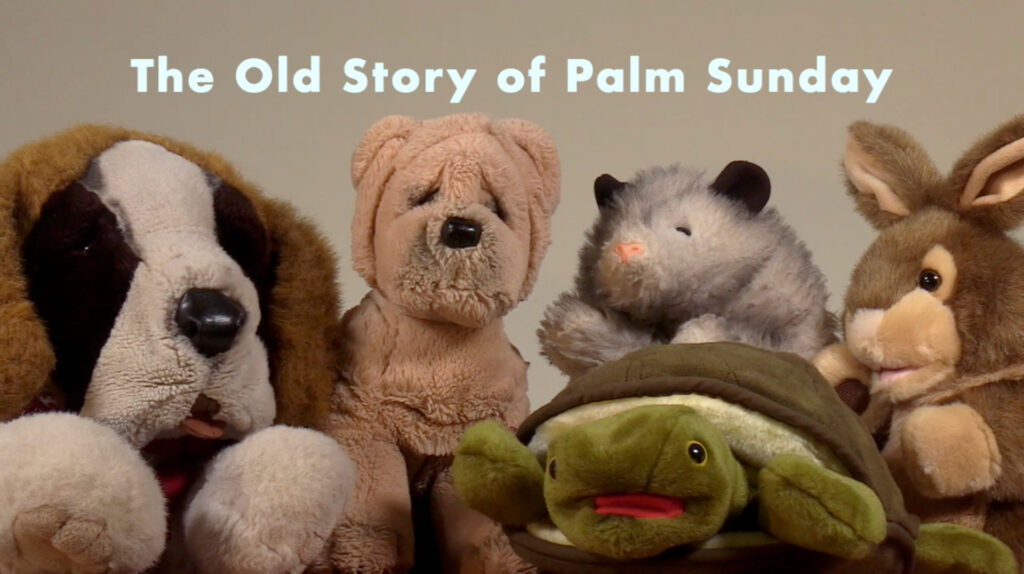Possum, Rolf, and Nicky, want to hear the story of Palm Sunday — although Dr. Sharpie and Muds are skeptical of that old story. So Dan gives them the Unitarian Universalist version.

The full script is below the fold.
Possum: Sharpie, Dan didn’t tell the Palm Sunday story last year.
Sharpie: Don’t you have that old story memorized by now?
Rolf: I like hearing people tell stories that I know by heart.
Muds: But that story is two thousand years old, so we don’t even know if it’s true.
Nicky: We want to hear it anyway.
Sharpie [sighing]: Dan, can you tell us the unscientific story of Palm Sunday?
Dan: I’d be glad to.
Rolf: We already know about the rabbi named Jesus of Nazareth who lived in the land of Judea and went from town to town teaching about religion, so you can skip that part.
Possum: And we know Jesus wasn’t an official Jewish religious leader, like the Pharisees, but many people listened to him because he treated everyone with respect, even people who were poor or homeless or sick.
Nicky: And they liked him because he said religion was simple: he said to love their God with all their heart and mind, and treat other people the way you’d like to be treated.
Dan: OK, I can take it from there. Jesus did most of his teaching in the countryside, but at last he and his followers decided to go to Jerusalem for Passover. Jesus and his followers were Jewish, and they wanted to celebrate Passover in Jerusalem, the most holy city for Jews.
They began to walk to Jerusalem. There were no cars or anything in those days, so they had to walk all the way. Jesus had been teaching and traveling for a long time, and he was tired. As they got close to Jerusalem, he asked his followers to find an animal for him to ride. They borrowed a foal, a young horse, for him to be able to ride.
Crowds of people were walking on the road to go to Jerusalem for Passover. Many them had seen Jesus before. Some of these people thought Jesus was the greatest religious teacher around. They began to point at Jesus, and call out to him.
Meanwhile, someone began to sing a hymn that seemed to fit what they were doing, and other joined in. They sang: “Enter into his gates with thanksgiving, And into his courts with praise.”
People were in a happy, festive mood. They gathered flowers, and picked leaves from palm trees, and carried them along. They sang: “Hosanna! Hosanna! Blessed is he that comes in the name of the Lord.”
All these people singing and walking into Jerusalem together! Some of the people who thought Jesus was a great religious teacher gave him flowers, and waved palm leaves over him.
At this point, Jesus was probably growing uncomfortable. He didn’t mind that people liked him, and thought he was a good religious teacher. But the singing, and the people giving him flowers and waving palm leaves over him — those were the kinds of things that people did for new kings of Jerusalem, back in the olden times, hundreds of years before Jesus lived.
Rolf: Uh oh, here comes trouble!
Sharpie: Shh!
Dan: But in Jesus’ day, the Romans ruled over Jerusalem. The Romans did not want anyone to question their authority. Treating Jesus like one of the kings of olden times was a way to question their authority. Could some of the people hope that Jesus would lead a rebellion against the Romans? Jesus knew that it was dangerous for them to even think about such things. So Jesus rode into Jerusalem, with the people waving palm leaves over him. And he wondered what the Romans might want to do.
And if you want to know what Jesus did in Jerusalem, and what the Romans did, I’ll tell you the rest of the story next week.
Possum: Arg! We have to wait a whole week to find out what happened!
